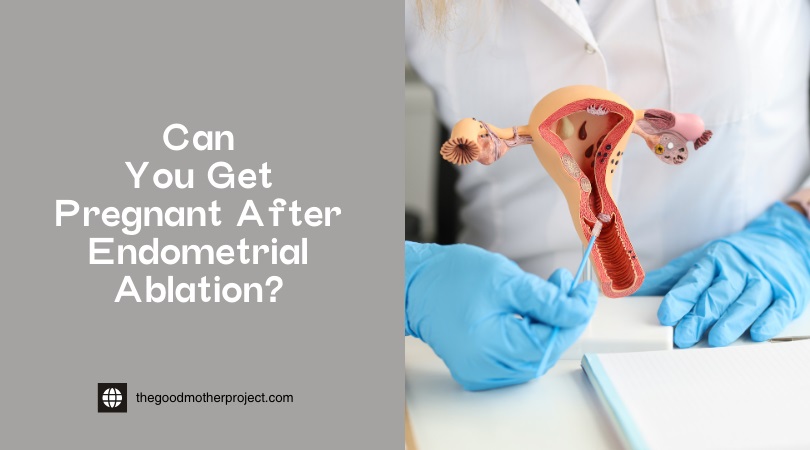Last Updated on January 6, 2025
Yes, it is possible to get pregnant after endometrial ablation, but the chances are significantly reduced. Many healthcare providers advise against attempting pregnancy post-procedure due to potential risks.
Endometrial ablation is a medical procedure designed to treat heavy menstrual bleeding by destroying the uterine lining. Women often seek this treatment to alleviate discomfort and improve quality of life. While it can be effective, it alters the uterus, which raises questions about future pregnancies.
The procedure can lead to complications if conception occurs, including risks of miscarriage and ectopic pregnancy. Understanding these implications is crucial for women considering endometrial ablation, especially those who may want to conceive later. Consulting a healthcare provider can provide personalized guidance and clarify any concerns.
The Basics Of Endometrial Ablation
Endometrial ablation is a medical procedure that reduces heavy menstrual bleeding. It removes or destroys the lining of the uterus, called the endometrium. Understanding this procedure helps women make informed choices about their health.
What Is Endometrial Ablation?
Endometrial ablation uses different methods to treat heavy periods. Here are the most common techniques:
- Radiofrequency: Uses heat to destroy the endometrium.
- Laser: Uses focused light to remove tissue.
- Electrosurgery: Uses electrical currents to cut tissue.
- Cryoablation: Uses extreme cold to freeze the lining.
This procedure is usually done in a doctor’s office or hospital. Recovery time is often quick. Many women experience less bleeding afterward.
Common Reasons For Undergoing The Procedure
Women choose endometrial ablation for several reasons:
| Reason | Description |
|---|---|
| Reason | Description |
| Heavy Menstrual Bleeding | Excessive bleeding that disrupts daily life. |
| Uterine Fibroids | Non-cancerous growths causing pain and bleeding. |
| Endometriosis | Painful condition where tissue grows outside the uterus. |
| Menorrhagia | Prolonged or excessive menstrual bleeding. |
Understanding these reasons helps in making the right decision. Always consult with a healthcare provider before proceeding.
Pregnancy After Endometrial Ablation: What Are The Odds?
Many women wonder about their chances of getting pregnant after endometrial ablation. This procedure reduces heavy menstrual bleeding. It can change your body’s response to pregnancy. Understanding your fertility after this treatment is essential.
Understanding Fertility Post-ablation
Endometrial ablation removes the uterine lining. This can impact your ability to conceive. Some women may still get pregnant after the procedure. However, the odds vary.
- About 10% to 20% of women may conceive after ablation.
- Pregnancy is more likely in younger women.
- Age and overall health play a significant role.
Many factors influence fertility after endometrial ablation:
- Type of ablation performed.
- Health conditions affecting fertility.
- Time since the procedure.
Risks And Considerations
Pregnancy after endometrial ablation carries risks. These risks include:
| Risk Factor | Description |
|---|---|
| Miscarriage | Higher chance due to uterine changes. |
| Preterm Birth | Increased risk of delivering early. |
| Placenta Issues | Potential for placenta previa or accreta. |
Consult a healthcare provider. They can evaluate your situation. Understanding risks helps in making informed decisions.
Fertility options exist for those wanting children post-ablation. Consider exploring these alternatives:
- Fertility treatments.
- Surrogacy.
- Adoption.
Always prioritize your health and safety. Knowledge is key to navigating this journey.
Debunking Myths Around Pregnancy Post-ablation
Many women worry about getting pregnant after endometrial ablation. Misunderstandings can lead to confusion. Let’s clear up some common myths.
Myth 1: Pregnancy Is Impossible After Ablation
Some believe that pregnancy is completely impossible after endometrial ablation. This is not true. While the procedure reduces the chance of pregnancy, it does not eliminate it.
- Some women have successfully conceived after the procedure.
- Pregnancy can still occur, but it may carry risks.
- It’s essential to discuss your specific situation with a healthcare provider.
Myth 2: No Risks Associated With Post-ablation Pregnancy
Another common myth is that pregnancy after ablation poses no risks. This belief is misleading. Pregnancies following this procedure can have complications.
| Potential Risks | Description |
|---|---|
| Miscarriage | Higher chance of miscarriage in some cases. |
| Ectopic Pregnancy | Increased risk of ectopic pregnancies. |
| Placental Issues | Placenta may have complications, such as previa. |
Understanding these risks is crucial for future mothers. Always consult with your doctor for personalized advice.
Frequently Asked Questions
Can Endometrial Ablation Affect Pregnancy Chances?
Endometrial ablation significantly reduces pregnancy chances and can lead to complications if pregnancy occurs.
What Happens If You Get Pregnant After Ablation?
Pregnancy after ablation can pose serious risks, including miscarriage and complications for both mother and baby.
Is Endometrial Ablation A Permanent Solution?
Endometrial ablation is often considered a permanent treatment for heavy menstrual bleeding but may not prevent future pregnancies entirely.
How Long After Ablation Can I Conceive?
It’s generally advised to wait at least 6 months after ablation before attempting to conceive to allow proper healing.
What Are The Alternatives To Endometrial Ablation?
Alternatives include hormonal treatments, IUDs, or surgical options like hysterectomy, depending on individual health needs.
Conclusion
Pregnancy after endometrial ablation is possible, but it comes with risks. Women should consult their healthcare provider for personalized advice. Understanding the implications of this procedure is crucial. Always prioritize your health and make informed decisions. Knowledge empowers you to navigate your reproductive options effectively.








